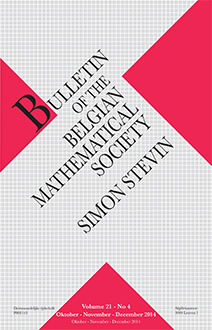Abstract
In this work we consider the non local evolution problem \[ \begin{cases} \partial_t u(x,t)=-u(x,t)+g(\beta K(f\circ u)(x,t)+\beta h), ~x \in\Omega, ~t\in[0,\infty[;\\ u(x,t)=0, ~x\in\mathbb{R}^N\setminus\Omega, ~t\in[0,\infty[;\\ u(x,0)=u_0(x),~x\in\mathbb{R}^N, \end{cases} \] where $\Omega$ is a smooth bounded domain in $\mathbb{R}^N; ~g,f: \mathbb{R}\to\mathbb{R}$ satisfying\linebreak certain growing condition and $K$ is an integral operator with symmetric kernel, $ Kv(x)=\int_{\mathbb{R}^{N}}J(x,y)v(y)dy.$ We prove that Cauchy problem above is well posed, the solutions are smooth with respect to initial conditions, and we show the existence of a global attractor. Furthermore, we exhibit a Lyapunov's functional, concluding that the flow generated by this equation has the gradient property.
Citation
Severino H. da Silva. Antonio R. G. Garcia. Bruna E. P. Lucena. "Dissipative property for non local evolution equations." Bull. Belg. Math. Soc. Simon Stevin 26 (1) 91 - 117, march 2019. https://doi.org/10.36045/bbms/1553047231
Information





